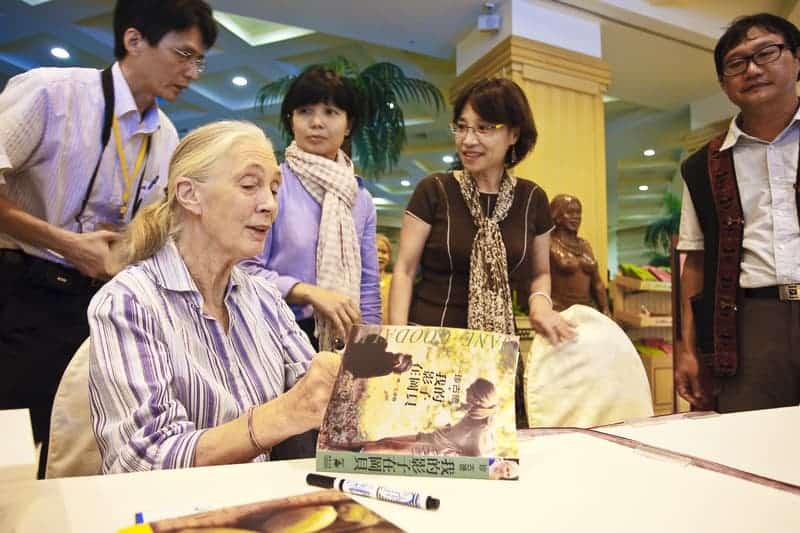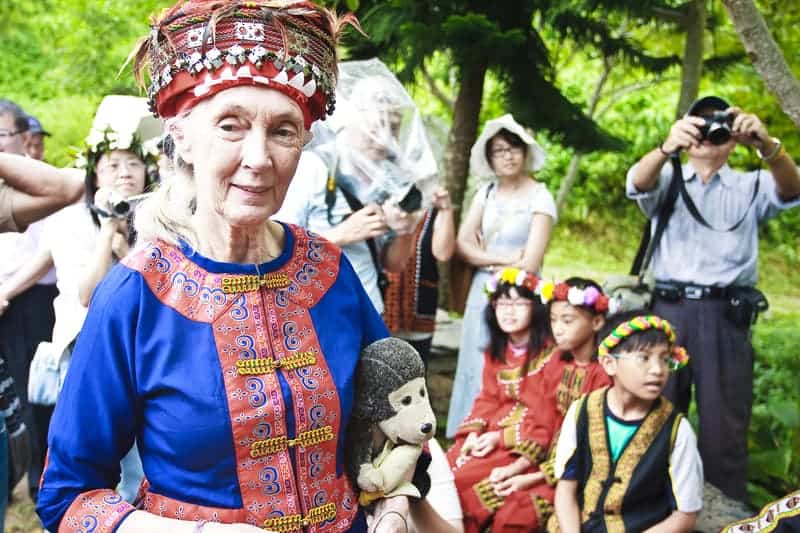You may know Jane Goodall as the world-renowned ethologist and conservationist who has dedicated her life to understanding and protecting chimpanzees. Her groundbreaking work in Gombe Stream National Park in Tanzania has transformed not only how we view our closest animal relatives but also the very concept of wildlife conservation.
As you delve into Goodall’s life story, you’ll find it’s a tale that weaves together science, empathy, and a resolute commitment to the environment.
Goodall’s journey began when she defied the norms of her time to follow her passion for animals and Africa. Venturing into the thickets of Gombe with nothing but binoculars and a notebook, she eventually made discoveries that would redefine the relationship between humans and animals.
Her observations challenged the scientific community’s entrenched beliefs and proved that chimpanzees have complex social behaviors and emotional lives similar to ours.
Read: Environmentalist Greta Thunberg
Her shift from pure research to conservation and activism has made her one of the most influential voices in environmentalism today. By engaging with communities and inspiring action across the globe, Goodall continues to advocate for the sustainability of our planet.
Her message is clear: every individual has a role to play in preserving the natural world. As you explore her contributions, you may find her optimism infectious, and perhaps you’ll be moved to join her in making a difference for our shared environment.
Early Life and Education
Jane Goodall’s journey began with a childhood filled with a love for animals, which shaped her future. Her educational path was unconventional but led her to groundbreaking research.
Childhood and Influences
Born on April 3, 1934, in London, England, Jane Goodall was fascinated by wildlife and the natural world from a young age. Your curiosity about animals would find inspiration in storytelling, most notably the tale of Tarzan of the Apes, igniting a passion to one day experience Africa and its wildlife. This childhood enthusiasm laid the foundation for her lifelong dedication to animal conservation and environmentalism.
University Years
You may find it interesting that Jane Goodall did not follow a traditional academic journey initially. Instead of going directly to university after finishing school, she worked as a secretary and later as a film assistant to fund her dreams of traveling to Africa.
Once there, her meeting with famed anthropologist Louis Leakey led to her enrollment in a PhD program at Cambridge University. Despite having no formal degree before this, Jane became one of the few people to earn a PhD without first obtaining a bachelor’s degree, a testament to her profound insights and natural expertise in primatology.

Groundbreaking Research
Jane Goodall’s groundbreaking research revolutionized how we understand primates and their behaviors. Her work shook the very foundations of primatology, and you’ll see why as you explore her landmark studies on chimpanzee behavior and the significant implications of her work at Gombe Stream National Park.
Chimpanzee Behavior Study
Your perception of animal intelligence may forever change when you learn about Goodall’s astonishing discoveries regarding chimpanzee behavior. She was the first to record chimpanzees making and using tools—a trait that was once considered uniquely human.
Goodall observed chimpanzees carefully selecting branches, stripping them of leaves, and using them to fish for termites, challenging previous perceptions of the capabilities of non-human animals. This finding, documented in National Geographic, not only altered the course of primatology but also blurred the lines differentiating humans from other animals.
Gombe Stream National Park
The lush landscapes of Gombe Stream National Park provided the perfect backdrop for Goodall’s pioneering work. It was here that she conducted her long-term study of wild chimpanzees, starting in 1960.
Over decades, Goodall meticulously documented the park’s chimpanzees’ social and family dynamics, displaying a complex society teeming with emotional connections, rivalries, and alliances.
This intimate glimpse into their world illustrated a rich tapestry of social bonds that mirrored many aspects of human societies and changed the way we view our closest animal relatives.
Conservation Efforts
Jane Goodall’s profound impact on animal conservation is realized through her established initiatives that focus on habitat preservation, community-centered conservation, and education.
Jane Goodall Institute
The Jane Goodall Institute (JGI) was founded in 1977, and it steers forward-looking conservation policies that safeguard chimpanzee habitats and other wildlife species. Your understanding of this effort should note that it underscores the coexistence of human needs and wildlife protection, promoting sustainable livelihoods alongside conservation.
Roots & Shoots Program
Furthermore, the Roots & Shoots Program, a youth-driven series of projects, empowers young people to act as informed conservationists. You’ll find that this program is active globally, instilling in school-aged kids the value of environmental stewardship through hands-on projects, like the recently established Basecamps in cities such as Los Angeles, Atlanta, and Tampa.
Advocacy and Public Engagement
Jane Goodall’s reach in advocacy and public engagement extends far beyond her ground-breaking scientific research. Through various platforms, she has tirelessly worked to connect with the public and policymakers alike, emphasizing the importance of conservation and environmental responsibility.
Lectures and Public Talks
You might have seen Dr. Goodall taking the stage at universities, global conferences, and community events. Her lectures aim to educate and inspire action for the environment, often sharing her experiences with the dignity and well-being of all living things. Her speaking engagements are a cornerstone of her advocacy work, where she invites you to become a steward of the planet.
Involvement in Films and Media
Media appearances and documentaries are other influential avenues for Dr. Goodall’s voice. Her life and work have been the subject of films designed to enlighten and motivate wider audiences.
You can witness her profound impact on conservation through these media narratives and understand her journey from the Gombe forest to the global stage. Her features in films and other media have amplified her call to global action, bringing attention to critical environmental and wildlife issues.
Published Works
Jane Goodall, a trailblazing primatologist and environmental advocate, has authored numerous influential books and scientific articles that have deeply impacted our understanding of primatology and conservation. Her works are not just scientific texts but also inspiring narratives that engage general audiences with their insightful reflections on nature and humanity.
Books by Jane Goodall
- The Book of Hope: A warm narrative co-authored with Douglas Abrams, providing insights into reasons for hope in challenging times. Explore this read on books by Jane Goodall.
- In the Shadow of Man: This groundbreaking work offers an intimate look at the complex world of chimpanzees, based on Goodall’s extensive research.
- Hope for Animals and Their World: Co-authored with Gail Hudson and Thane Maynard, this book details compelling stories of endangered species recovery. Discover more about her work at Goodreads.
Scientific Articles
- Goodall’s numerous scientific articles have shed light on the previously unknown social behaviors of chimpanzees, including their tool-making abilities, which challenged established notions of human uniqueness. Her findings were instrumental in redefining the relationship between humans and animals in the scientific community. Notable articles detail the chimpanzees’ use of tools and their social interactions.
- Her extensive field work has been published in various academic journals, allowing other scientists and enthusiasts to build upon her work.

Awards and Recognition
Jane Goodall has received numerous accolades that underscore her lifetime contributions to science and her advocacy for the planet. Here, you’ll discover the honors that celebrate her groundbreaking work with chimpanzees and her tireless efforts in conservation and humanitarian outreach.
Scientific Honors
- 1980: Order of the Golden Ark, World Wildlife Award for Conservation Jane Goodall was recognized for her innovative and continuous study of chimpanzees.
- 2021: Templeton Prize Acknowledging her work that blends scientific discovery with spiritual insights.
Cultural and Humanitarian Awards
- 1985: Living Legacy Award From the International Women’s League, acknowledging her ongoing activism.
- Numerous Honorary Degrees: Bestowed by prestigious universities worldwide, honoring her scientific achievements and contributions to environmental and humanitarian causes.
Your exploration of Jane Goodall’s achievements reveals how her insights and dedication have moved beyond academia, earning her positions of respect across various spheres of influence.
Legacy and Impact
Jane Goodall’s enduring legacy in primatology and environmentalism is profound. Through her pioneering research with wild chimpanzees at Gombe Stream National Park, Tanzania, you can appreciate her reshaping of human perspectives on animal intelligence and social behavior.
- Discovery: She discovered that chimpanzees make and use tools—a trait that was once thought to be uniquely human.
- Conservation: You might be inspired by her work in establishing the Jane Goodall Institute, which continues her legacy by promoting conservation and animal welfare.
- Education: She advocates education on environmental matters, profoundly influencing future generations.
Furthermore, your understanding of humanity’s place in the natural world is likely enriched by Dr. Goodall’s message of hope and her efforts to promote sustainable living, recognizing the interconnectedness of all life.
Her work transcends scientific achievements, fostering global communities of youths and adults who are motivated to protect the environment through programs like Roots & Shoots. The initiative encourages you to be stewards of the planet, empowering people of all ages to partake in community action.
Read: Environmentalist Paul Watson
Goodall’s role as a UN Messenger of Peace exemplifies her global impact, echoing her belief that each individual has the potential to make a difference. The narrative of her work continues to grow as institutions like the Walking Mountains Science Center celebrate her considerable influence not just on wildlife conservation but also on broader environmental awareness and action against climate change.
Current Projects and Initiatives
The Jane Goodall Institute (JGI) is actively involved in numerous environmental and conservation projects that could greatly interest you. Here’s what you might find engaging:
- Community-Centered Conservation: Learn about the projects fostering local community action, such as fuel-efficient stoves and sustainable agriculture practices.
- Wildlife Research: Dive into the world of primatology with ongoing baboon research that seeks to understand their behaviors and social structures better.
- Education and Scholarships: Discover how JGI encourages conservation leadership by providing girls’ scholarships, and advocating for education to secure a better future for all.
- Sustainable Livelihood Programs: Engage with initiatives that support income diversification, like coffee production and beekeeping, which help communities thrive while protecting biodiversity.
- Habitat Restoration: Be a part of global reforestation efforts to combat climate change and deforestation through initiatives like Jane’s Green Hope, aligned with the Trillion Trees Vision.
Whether you’re moved by grassroots activism or global strategy, you’ll find a project with the Jane Goodall Institute that resonates with your passion for conservation.